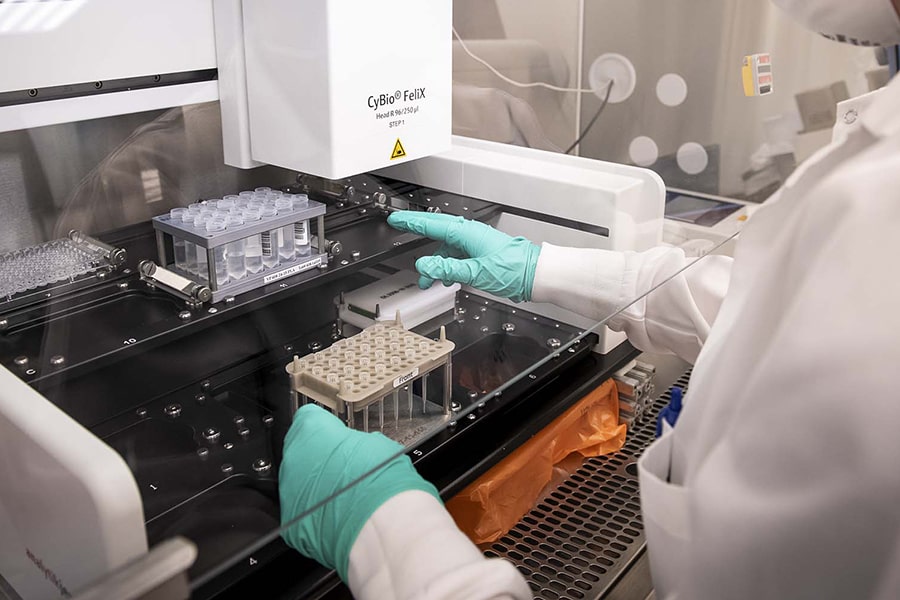Letronne Feels Fulfilled Directing New Tartan Testing Lab
By Bruce Gerson
The pandemic, Carnegie Mellon University and a friendship have given Florent “Flo” Letronne the chance of a lifetime.
Letronne, a native of Dunkirk, France, recently joined CMU as science director of the Tartan Testing Lab, the latest element in the university’s ongoing strategy to detect and prevent the spread of COVID-19 in the Pittsburgh campus community. The clinical lab is ramping up to be able to process as many as 10,000 asymptomatic tests each week from students, faculty and staff who are studying and working in Pittsburgh.
“I’ve been working in scientific research for about 10 years now, and I wanted to be involved in a more direct, more impactful way to help people,” said Letronne, who came to the University of Pittsburgh five years ago for a postdoctoral fellowship to study dementia. “This is a pandemic, this is a crisis and I wanted to help as much as I could by using all the knowledge, tools and skills I accumulated along the way.”
“This is a pandemic, this is a crisis and I wanted to help as much as I could.”
Letronne earned a Ph.D. in neuroscience at the University of Lille in France after earning his undergraduate degree in health biology, a combination of physiology, physiopathology, pharmacology and neuroscience. In Pittsburgh, his partner introduced him to Dr. Christine Andrews, CMU’s chief medical officer. Friends for several years, Andrews knew of Letronne’s skills and his interest in pursuing other opportunities and approached him about the job.
“CMU gave a chance to a young researcher, a foreigner, and a proud member of the LGBTQ community to be the laboratory director of this intense project,” Letronne said. “This is a very impressive adventure, and I’m very proud to be part of this incredible story.”
Andrews said she knew Letronne was a “natural fit” for the job.
“He is incredibly hardworking and one of the nicest people I have ever met,” she said. “He has taken the lead with excitement and has energized our team.”
“This is a very impressive adventure, and I’m very proud to be part of this incredible story.”
As the lab’s science director, Letronne, with help from CMU professors Jonathan Minden and Anne Robinson, has put testing processes and protocols in place, and has hired four technicians and two supervisors to cover two six-hour shifts, Monday through Friday. The high-complexity lab in the Pittsburgh Technology Center on Second Avenue has been certified by the CLIA (Clinical Laboratory Improvement Amendments), which regulates more than 260,000 laboratories nationwide, and by Dr. Kossivi Dantey, a pathologist in the Allegheny Health Network who is serving as the lab’s medical director.
“Working with the COVID emergency team at CMU under Vice President for Research Michael McQuade has been amazing,” Letronne said. “A team of dedicated people from different horizons have been very successful working together to build this lab for everyone at CMU. CMU should be very proud.”
Saliva samples are brought to the lab from the East Campus Garage collection site several times a day. Once in the lab, two robots, called liquid handlers, transfer the samples from the collection tubes into specimen plates, where they are heated to deactivate any virus that may be present. Reagents are added to the samples, and they are placed into qPCR (quantitative Polymerase Chain Reaction) machines, which detects if the COVID-19 virus exists.
“Even though there is still lots to do, I have a deep feeling of accomplishment that I never had before.”
Saliva samples are tested in bulk — each specimen plate can hold up to 384 samples — and the qPCR machines can determine whether the samples are positive or negative in about 1 hour and 15 minutes. Results are sent back to University Health Services, and individuals are notified in as little as 2-3 days.
“It’s a great asset and a great value to have a testing center at home, where you can test everyone on campus,” Letronne said. “Third-party labs take between 3 and 7 days for results, and there’s no real value in that.”
When Letronne is not in the lab, he enjoys CrossFit, walking his dog, hiking in Frick Park, woodworking and thinking about his new role.
“Even though there is still lots to do, I have a deep feeling of accomplishment that I never had before,” he said.

 The Tartan COVID-19 Asymptomatic Testing Program, or Tartan Testing for short, will allow all asymptomatic Carnegie Mellon students, faculty and staff in the Pittsburgh area — as well as on-campus dining and custodial affiliates — to be tested once a week throughout the spring semester.
The Tartan COVID-19 Asymptomatic Testing Program, or Tartan Testing for short, will allow all asymptomatic Carnegie Mellon students, faculty and staff in the Pittsburgh area — as well as on-campus dining and custodial affiliates — to be tested once a week throughout the spring semester.